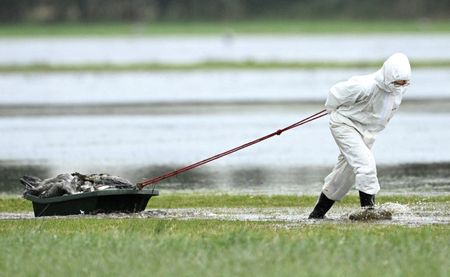By Sybille de La Hamaide
PARIS (Reuters) -Bird flu is spreading rapidly in Europe, with the highest number of countries in at least a decade reporting early outbreaks, raising concerns about a repeat of past crises that led to the culling of tens of million birds and higher food prices.
The spread of highly pathogenic avian influenza, commonly called bird flu, is a concern for governments and the poultry industry due to the devastation it can cause to flocks, the possibility of trade restrictions and a risk of a new pandemic.
The disease, mainly spread by migrating wild birds, caused 56 outbreaks in 10 EU countries and Britain from August to mid-October, mostly in Poland — the top EU poultry producer — Spain and Germany, France’s animal health surveillance body ESA said.
This is the first time it has spread to 10 countries this early in the season for at least a decade, although the total number of outbreaks remains lower than in 2022 when the bloc recorded its worst ever bird flu crisis.
Last year there were 31 outbreaks in nine countries during the same period.
“All these cases in Europe show that the virus is far from gone,” said Yann Nedelec, director of French poultry industry group Anvol.
POULTRY ORDERED INDOOR AS VIRUS SPREADS
Since ESA’s latest report, Belgium and Slovakia this week reported their first bird flu cases of the season, the World Organisation for Animal Health said on Wednesday, which prompted Belgium to order that all poultry be kept indoors.
Two other outbreaks also emerged in France, another major poultry producer, the farm ministry said on Tuesday as it ordered that birds be confined, citing rising outbreaks in Spain and Germany. Last year the order came in November and in December the year before.
The risk of bird flu for humans remains low, with most people infected having been in close contact with infected animals, but the virus needs to be monitored as it increasingly spreads to mammals, the World Health Organisation said.
France has begun its third annual bird flu vaccination campaign for farm ducks, making it the first major poultry exporter to do so nationwide. It has credited the policy with curbing the disease.
Bird flu has also hit the U.S. and Asia. Over 180 million birds were culled in the U.S., affecting egg prices and infecting dairy cows and people.
Brazil, the world’s largest poutry exporter, faced an outbreak but is now free of bird flu. Japan reported its first case of the season this week.
(Reporting by Sybille de La Hamaide, Editing by Nigel Hunt and William Maclean)









